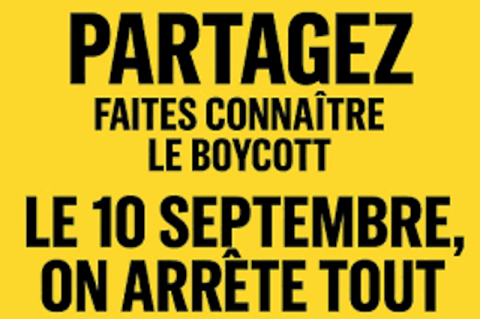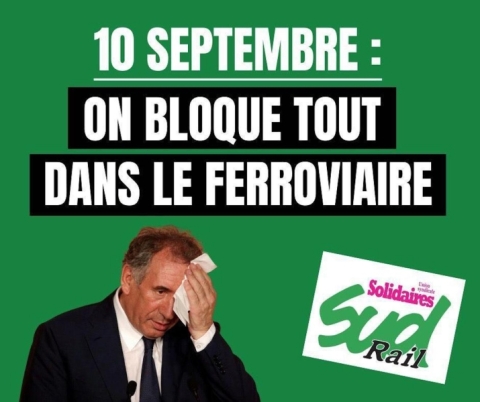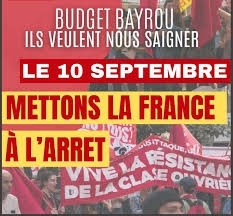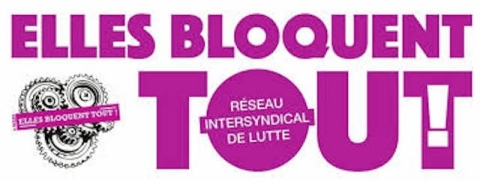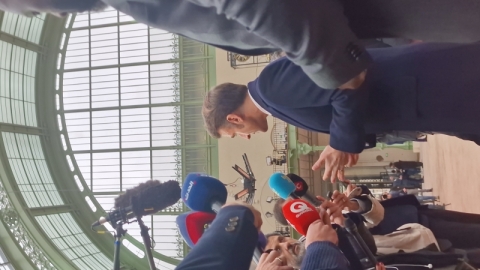Politics
FRANCE GEARS UP FOR MASSIVE “ ON BLOQUE TOU” GENERAL STRIKE & BLOCKADES MOVEMENT
SET FOR SEPT, 10th 2025

ON BLOQUE TOUT Banner (Source: CGT, Humanite)
USPA NEWS -
France Gears Up for Massive “On Bloque Tout” General Strike and Blockades “On Bloque Tout”: France’s Nationwide Blockade and Strike Movement on September 10,2025. It is a New Wave of Nationwide Protests Echoing the Yellow Vests Movement, which erupted in 2018.
A new social and political movement under the banner “On Bloque Tout” (We Block Everything) has gained momentum in France, calling for a nationwide general strike and blockade scheduled for September 10, 2025. Emerging mainly through social media and encrypted messaging platforms, this movement aims to protest the French government's recent announcement to abolish two public holidays, a decision perceived as part of broader austerity measures by Prime Minister François Bayrou’s administration.
The general blockade set for September 10 reflects a deep sentiment of crisis among the French population, with recent ELABE and IFOP polls indicating that 68% (Polls, ELABE and IFOP surveys (2025) cited by BFMTV and Le Monde) of French citizens desire the resignation of President Emmanuel Macron.
A new social and political movement under the banner “On Bloque Tout” (We Block Everything) has gained momentum in France, calling for a nationwide general strike and blockade scheduled for September 10, 2025. Emerging mainly through social media and encrypted messaging platforms, this movement aims to protest the French government's recent announcement to abolish two public holidays, a decision perceived as part of broader austerity measures by Prime Minister François Bayrou’s administration.
The general blockade set for September 10 reflects a deep sentiment of crisis among the French population, with recent ELABE and IFOP polls indicating that 68% (Polls, ELABE and IFOP surveys (2025) cited by BFMTV and Le Monde) of French citizens desire the resignation of President Emmanuel Macron.
France Gears Up for Massive “On Bloque Tout” General Strike and Blockades “On Bloque Tout”: France’s Nationwide Blockade and Strike Movement on September 10,2025. It is a New Wave of Nationwide Protests Echoing the Yellow Vests Movement, which erupted in 2018.
A new social and political movement under the banner “On Bloque Tout” (We Block Everything) has gained momentum in France, calling for a nationwide general strike and blockade scheduled for September 10, 2025. Emerging mainly through social media and encrypted messaging platforms, this movement aims to protest the French government's recent announcement to abolish two public holidays, a decision perceived as part of broader austerity measures by Prime Minister François Bayrou’s administration.
A new social and political movement under the banner “On Bloque Tout” (We Block Everything) has gained momentum in France, calling for a nationwide general strike and blockade scheduled for September 10, 2025. Emerging mainly through social media and encrypted messaging platforms, this movement aims to protest the French government's recent announcement to abolish two public holidays, a decision perceived as part of broader austerity measures by Prime Minister François Bayrou’s administration.
The general blockade set for September 10 reflects a deep sentiment of crisis among the French population, with recent ELABE and IFOP polls indicating that 68% (Polls, ELABE and IFOP surveys (2025) cited by BFMTV and Le Monde) of French citizens desire the resignation of President Emmanuel Macron. This widespread frustration stems from what many see as a democratic, social, and financial deadlock. Adding to the uncertainty, the current government faces a critical vote of confidence in Parliament on September 8, 2025, which could bring down Prime Minister François Bayrou's administration.
FRANCE IS ABOUT TO FACE “On Bloque Tout”: A NEW WAVE OF NATIONWIDE PTOTESTS ECHOING TE YELLOW VEST MOVEMENT
Prime Minister François Bayrou, while firm on his policy stance, appeared relatively unfazed by the mobilization, implying that a protest involving up to 100,000 people would not significantly disrupt governmental plans. However, the Minister of the Interior, Bruno Retailleau, delivered a much sterner message, characterizing the movement as “stupid” and “worse than anything,” warning of possible significant disruptions and calling for prefects to prevent any blockades of critical infrastructure. Retailleau specifically highlighted anticipated radical actions including blockades of petrochemical platforms and sabotage.
Prime Minister François Bayrou, while firm on his policy stance, appeared relatively unfazed by the mobilization, implying that a protest involving up to 100,000 people would not significantly disrupt governmental plans. However, the Minister of the Interior, Bruno Retailleau, delivered a much sterner message, characterizing the movement as “stupid” and “worse than anything,” warning of possible significant disruptions and calling for prefects to prevent any blockades of critical infrastructure. Retailleau specifically highlighted anticipated radical actions including blockades of petrochemical platforms and sabotage.
Despite the government's warnings, substantial sectors have already declared intentions to join or support the strike. The public health sector (APHP), RATP (Paris public transport), SNCF (national railways), and the airports are among those announcing strike actions coinciding with the movement’s date
A new social and political movement under the banner “On Bloque Tout” (We Block Everything) has gained momentum in France, calling for a nationwide general strike and blockade scheduled for September 10, 2025. Emerging mainly through social media and encrypted messaging platforms, this movement aims to protest the French government's recent announcement to abolish two public holidays, a decision perceived as part of broader austerity measures by Prime Minister François Bayrou’s administration.
A new social and political movement under the banner “On Bloque Tout” (We Block Everything) has gained momentum in France, calling for a nationwide general strike and blockade scheduled for September 10, 2025. Emerging mainly through social media and encrypted messaging platforms, this movement aims to protest the French government's recent announcement to abolish two public holidays, a decision perceived as part of broader austerity measures by Prime Minister François Bayrou’s administration.
France is preparing for an unprecedented nationwide blockade scheduled for September 10, 2025, under the banner “On Bloque Tout” (We Block Everything). This movement calls for a complete halt of all production and consumption across the country, aiming for zero economic and social activity in a form of protest unlike anything seen before in modern French history. Unlike previous revolts, typically led or controlled by identifiable trade unions or political parties, this movement is decentralized, fluid, and protean, mainly born and spread through social media and citizen collectives. It expresses widespread anger and frustration among the French population, particularly against recent austerity measures.
At the heart of this crisis is France’s soaring public debt, which reached approximately €3.3 trillion in early 2025 about 114% of the country's GDP, the highest in the Eurozone after Greece and Italy. The government’s fiscal health is under severe strain, with interest payments on the debt surging and crowding out other key public expenditures. Prime Minister François Bayrou recently presented an alarming financial assessment during a press conference, warning the country stands at a critical juncture. As part of austerity efforts to manage this crisis, he announced the controversial decision to eliminate two public holidays a step described by many as the “last straw” that caused public outrage to overflow. Prime Minister Bayrou underscored the gravity of the situation with a stark declaration: “It will be with me or chaos,” referencing the high stakes of maintaining order amidst growing unrest.
This volatile environment has catalyzed the rise of the “On Bloque Tout” movement, which breaks with traditional protest models and signals a new, more unpredictable chapter in French social dissent.
This volatile environment has catalyzed the rise of the “On Bloque Tout” movement, which breaks with traditional protest models and signals a new, more unpredictable chapter in French social dissent.
2025 FRENCH BLOCKADES MOVEMENT : POLITIC, SYTRIKES, & PUBLIC OUTCRY ON SEPT 10, 2025: ORIGINS & MOTIVATIONS
This movement “ON BLOQUE TOUT” (“WE BLOCK EVERYTHING”) was born out of public outrage following the government's plan announced by Prime Minister Bayrou to remove two days off from the calendar. Activists argue this is symptomatic of a government increasingly disconnected from the everyday realities of workers and families. Organized mostly online, the campaign gained traction quickly, calling for total disruption across all sectors.
This movement “ON BLOQUE TOUT” (“WE BLOCK EVERYTHING”) was born out of public outrage following the government's plan announced by Prime Minister Bayrou to remove two days off from the calendar. Activists argue this is symptomatic of a government increasingly disconnected from the everyday realities of workers and families. Organized mostly online, the campaign gained traction quickly, calling for total disruption across all sectors.
GOVERNMENT & POLITICAL REACTIONS
French Prime Minister François Bayrou, while firm on his policy stance, appeared relatively unfazed by the mobilization, implying that a protest involving up to 100,000 people would not significantly disrupt governmental plans. However, the Minister of the Interior, Bruno Retailleau, delivered a much sterner message, characterizing the movement as “stupid” and “worse than anything,” warning of possible significant disruptions and calling for prefects to prevent any blockades of critical infrastructure. Interior Minister, Bruno, Retailleau specifically highlighted anticipated radical actions including blockades of petrochemical platforms and sabotage.
Despite the government's warnings, substantial sectors have already declared intentions to join or support the strike. The public health sector (APHP, Parisian Hospitals), RATP (Paris public transport), SNCF (national railways), and the airports are among those announcing strike actions coinciding with the movements date.
French Prime Minister François Bayrou, while firm on his policy stance, appeared relatively unfazed by the mobilization, implying that a protest involving up to 100,000 people would not significantly disrupt governmental plans. However, the Minister of the Interior, Bruno Retailleau, delivered a much sterner message, characterizing the movement as “stupid” and “worse than anything,” warning of possible significant disruptions and calling for prefects to prevent any blockades of critical infrastructure. Interior Minister, Bruno, Retailleau specifically highlighted anticipated radical actions including blockades of petrochemical platforms and sabotage.
Despite the government's warnings, substantial sectors have already declared intentions to join or support the strike. The public health sector (APHP, Parisian Hospitals), RATP (Paris public transport), SNCF (national railways), and the airports are among those announcing strike actions coinciding with the movements date.
SEVERAL POLTICIAL PARTIES HAVE VOICED THEIR POSITIONS WITH VARYING DEGREES OF SUPPORT OR CAUTION
Several political parties have voiced their positions with varying degrees of support or caution: Jean Luc Melenchon’s (Far Left Party, La France Insoumise leader) has endorsed the strike, advocating for general mobilization. The Socialist Party signals also solidarity with protesters. The Greens party supports the movement but caution against political exploitation. The far-right Rassemblement National (National Rally, Far Right Marine Le Pen’s Party) takes a neutral stance, leaving participation to individual choice. The #Gueux movement as well (A politic movement under the leadership of writer Alexandre Jardin).
Several political parties have voiced their positions with varying degrees of support or caution: Jean Luc Melenchon’s (Far Left Party, La France Insoumise leader) has endorsed the strike, advocating for general mobilization. The Socialist Party signals also solidarity with protesters. The Greens party supports the movement but caution against political exploitation. The far-right Rassemblement National (National Rally, Far Right Marine Le Pen’s Party) takes a neutral stance, leaving participation to individual choice. The #Gueux movement as well (A politic movement under the leadership of writer Alexandre Jardin).
PARTICIPATIONS & ACTIONS
The movement’s coalition includes major trade unions such as the CGT and Force Ouvriere, syndicates from the education sector, and various activist groups, some with roots in the Yellow Vest protests of 2018. Actions planned range from mass demonstrations to more disruptive tactics, such as blocking transport hubs, petrochemical facilities, and schools.
The movement’s coalition includes major trade unions such as the CGT and Force Ouvriere, syndicates from the education sector, and various activist groups, some with roots in the Yellow Vest protests of 2018. Actions planned range from mass demonstrations to more disruptive tactics, such as blocking transport hubs, petrochemical facilities, and schools.
COMPARISON WITH THE 2018 YELLOW VEST MOVEMENT
Similarities with the Yellow Vest movement of 2018 are evident in the grassroots, decentralized nature of the protests and the use of direct action tactics like roadblocks and infrastructure disruptions. Both movements stem from socio-economic grievances and frustration with state policies perceived as dismissive of ordinary citizens’ needs. Nevertheless, the current context differs in several ways: the government faces acute fiscal challenges and the political landscape is marked by fragile coalitions. Unlike the prolonged and widespread Yellow Vest protests that fragmented over time, the “On Bloque Tout” movement is concentrated on a singular planned day with uncertain longevity.
Similarities with the Yellow Vest movement of 2018 are evident in the grassroots, decentralized nature of the protests and the use of direct action tactics like roadblocks and infrastructure disruptions. Both movements stem from socio-economic grievances and frustration with state policies perceived as dismissive of ordinary citizens’ needs. Nevertheless, the current context differs in several ways: the government faces acute fiscal challenges and the political landscape is marked by fragile coalitions. Unlike the prolonged and widespread Yellow Vest protests that fragmented over time, the “On Bloque Tout” movement is concentrated on a singular planned day with uncertain longevity.
Despite the government's warnings, substantial sectors have already declared intentions to join or support the strike. The public health sector (APHP), RATP (Paris public transport), SNCF (national railways), and the airports are among those announcing strike actions coinciding with the movement’s date.
As France prepares for September 10, the government braces for significant disturbances amid broad social discontent. The outcome could mark a critical moment in French socio-political dynamics, echoing past mass mobilizations while representing new challenges for governance. Prime Minister François Bayrou, while firm on his policy stance, appeared relatively unfazed by the mobilization, implying that a protest involving up to 100,000 people would not significantly disrupt governmental plans. However, the Minister of the Interior, Bruno Retailleau, delivered a much sterner message, characterizing the movement as “stupid” and “worse than anything,” warning of possible significant disruptions and calling for prefects to prevent any blockades of critical infrastructure. Retailleau specifically highlighted anticipated radical actions including blockades of petrochemical platforms and sabotage.
The “On Bloque Tout” movement has proven difficult for French media to define and contain. Its participants appear numerous and predominantly emerging from civil society rather than being clearly affiliated with any political party. As Sarah Rami, one of the spokespersons of “One Ne Veut Plus,” an organization within the broader “On Bloque Tout” aggregation, declared: “This is a popular protest movement that transcends parties, and whose goal is to bring down President Emmanuel Macron…. President of the Republic, Emmanuel Macron, has not yet made a formal public statement specifically addressing the “On Bloque Tout” movement. However, in response to journalists' questions about the growing social unrest and calls for his resignation, President Emmanuel Macron firmly declared on September 2, 2025, at the Elysee Palace: “I will not resign.” This statement underlined his determination to remain in office despite the mounting challenges and protests facing his government To be continued../
Elysee Palace press briefing, Paris, September 2, 2025, as reported by Le Monde and Tf1). BFM TV, “Mouvement ‘Bloquons tout’ du 10 septembre,2025”, France 24 “Bruno Retailleau calls for firmness ahead of the 10 September blockades,”, 2025; 20 Minutes “Why they want to ‘block everything’ in France on September 10, 2025”Public Senat “What to expect on September 10, 2025”
Liability for this article lies with the author, who also holds the copyright. Editorial content from USPA may be quoted on other websites as long as the quote comprises no more than 5% of the entire text, is marked as such and the source is named (via hyperlink).

